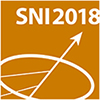Speaker
Description
The Magnetocaloric Effect forms the basis of magnetocaloric refrigeration technology, which is a novel energy efficient and environmentally friendly method for cooling [1]. MnFe4Si3 is an interesting magnetocaloric material, which features a modestly large magnetic entropy change as it contains only environmentally unproblematic and abundant elements; it has also some application relevance. Finally the structure contains different transition metal sites, which have recently been discussed as a common structural feature of many transition metal magnetocaloric materials. So a detailed study on magnetization processes is an important prerequisite in understanding this compound.
In this contribution we combine results from neutron depolarization experiments [2] carried out using Cryopad setup at single crystal diffractometer POLI at MLZ [3] with direct measurements of the adiabatic temperature change in pulsed magnetic fields using a home-built experimental set-up in HLD [4]. The results will be compared to the ones obtained from the magnetization and heat capacity measurements in static magnetic fields.
[1] K.A. Gschneidner Jr. and V.K. Pecharsky, International J. Refrigeration 2008, 31, 945 – 961.
[2] M. T. Rekveldt, Physica B 1999, 267-268, 60-68
[3] V. Hutanu W. Luberstetter, E. Bourgeat-Lami, et.al., Review of Scientific Instruments 87, 105108 (2016)
[4] M. G. Zavareh, C. S. Mejía, A. K. Nayak, et.al., Appl. Phys. Lett. 2015,106.

